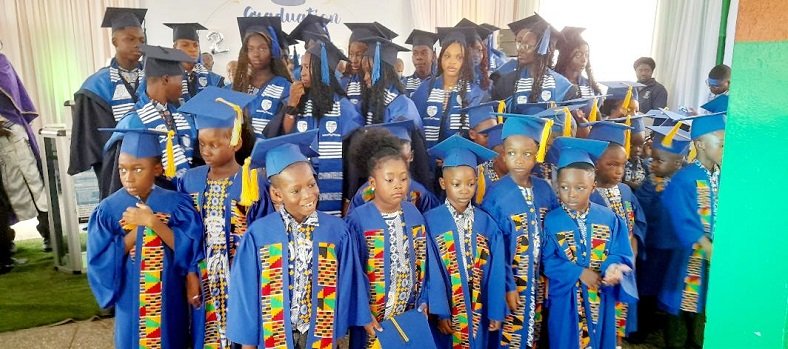News
64 promoted at 8th West End Intl School graduation ceremony

Granduands of West End Intl School
The Co-founder and Chief Executive Officer (CEO) of Bountiful technologies, Mr Seth Ogoe Ayim has urged students to embrace failure and learn valuable lessons in their pursuit for academic laurels.
That, he said would position them to navigate the world of work sometimes engulfed with uncertainties and disappointments.
Mr Ogoe who was the Special Guest Speaker at the Eight Graduation Ceremony of the West End International School (WEIS) in Accra on Saturday, said failure was part of the processes to be successful.
“You must also study and be willing to embrace failure which will help you to learn valuable lessons to succeed. Use technology to your advantage and together, we can build a better future,” he stressed.
The graduation ceremony saw 20 pre-school pupils promoted to primary school while 44 Junior High School (JHS) students graduated to Senior High School (SHS).
Prizes were presented to deserving graduates with Felix Ofoe emerging as the Best Graduating Student for pre-school while Kwesi Nyan Brew topped at the JHS level.
All graduating students received certificates.
In his address, the Executive Director for WEIS, Mr J.M Adjekum urged students to focus on attaining knowledge that will not only transform their countries but the world at large.
He called on parents to support their children to explore their talents and develop same to greater heights.
The Ga South Municipal Director of Education, Mr Henry Ayetse reiterated the need to be disciplined and hold fast to the values instilled in them at the WEIS.
There were performances from the pre-school pupils, the WEIS choir as well as the WEIS band who treated guests to some remarkable live band performances.
By Michael D. Abayateye
News
Family of late Nana Konadu Agyeman-Rawlings thank Ghanaians, invites tributes to celebrate her legacy

The Agyeman-Rawlings and allied families have expressed heartfelt gratitude to Ghanaians and friends around the world for the immense love and sympathy shown following the sudden passing of Mrs. Nana Konadu Agyeman-Rawlings, former First Lady of the Republic of Ghana.
Nana Konadu Agyeman-Rawlings passed away on Thursday, October 23, 2025.
In an announcement, the family invited individuals, groups, and institutions who wish to honour her memory to submit tributes via email to TRIBUTES@NANAKONADU.ORG.
They encouraged friends and well-wishers to share their personal experiences, photographs, videos, and memories of how the late former First Lady touched their lives through her work.
According to the family, those who prefer to submit hard copies may deliver their tributes and photos to Trudy at the Office of Former President Rawlings, located at No. 1 Sekou Toure Link, Ridge, near the Ridge Hospital.
The family urged that all tributes be submitted within two weeks of the announcement.
The family expressed appreciation for the continued prayers, kind words, and support they have received during this difficult period.
By: Jacob Aggrey
News
Government to build rehabilitation centers nationwide to tackle opioid abuse – Youth Minister

The Minister for Youth Development and Empowerment, George Opare Addo, says government will build rehabilitation centers across the country to tackle rising cases of drug and opioid abuse among the youth.
He explained that the centers will not be set up solely to address betting addiction, as reported earlier, but to help young people struggling with substance use and mental health challenges.
According to him, government-owned rehabilitation facilities are few, making it hard for victims to access proper care.
Mr. Opare Addo urged betting companies and other private organizations to support the project as part of their corporate social responsibility.
He said the initiative aims to give young people the help they need to overcome addiction and live productive lives.
By: Jacob Aggrey






